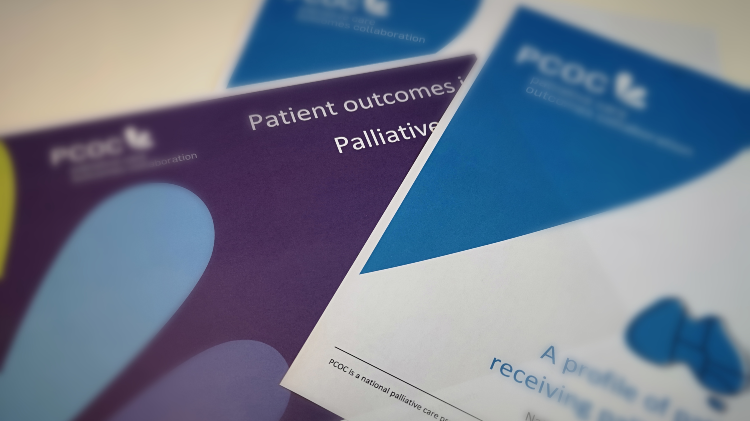All PCOC peer-reviewed publications since 2004 are available below.
Publications
2022
Saurman E, Allingham S, Draper K, Edwards J, Moody J, Hooper D, Kneen K, Connolly J and Eagar K (2022) Preferred place of death—A study of two specialist community palliative care services in Australia. Journal of Palliative Care, 37 (1): 26-33.
Sousa MS, Davis W, Blanchard M, Razmovski-Naumovski V, Agar M, Daveson B, HSM D and Currow DC (2022) Appetite-related distress is burdensome in the last sixty days of life of people receiving palliative care: A national longitudinal consecutive cohort study. Journal of Palliative Medicine, http://doi.org/10.1089/jpm.2021.0462.
2021
Barnes-Harris M, Allingham S, Morgan D, Ferreira D, Johnson MJ, Eagar K and Currow D (2021) Comparing functional decline and distress from symptoms in people with thoracic life-limiting illnesses: lung cancers and non-malignant end-stage respiratory diseases. Thorax. 76: 989-995
Clapham S, Daveson B, Allingham S, Morris D, Blackburn P, Johnson C and Eagar K (2021) Patient-reported outcome measurement of symptom distress is feasible in most clinical scenarios in palliative care: An observational study involving routinely collected data. International Journal for Quality in Health Care, 33 (2): mzab075.
Currow D, Davis W, Connolly A, Krishnan A, Wong A, Webster A, Barnes-Harris M, Daveson B and Ekström M (2021) Sleeping-related distress in a palliative care population: A national, prospective, consecutive cohort. Palliative Medicine. 35 (9): 1663-1670
Daveson B, Allingham SF, Clapham S, Johnson CE, Currow DC, Yates P and Eagar K (2021) The PCOC Symptom Assessment Scale (SAS): A valid measure for daily use at point of care and in palliative care programs. PLoS One, 16 (3): e0247250.
Ding J, Johnson CE, Qin X, Ho SCH and Cook A (2021) Palliative care needs and utilisation of different specialist services in the last days of life for people with lung cancer. European Journal of Cancer Care, 30 (1): e13331.
Eagar K, Hillman K, Williams L and Reader M (2021) A question worth asking: What matters most at end of life? MJA InSight+ (Issue 14, 26 April 2021).
Murtagh FE, Firth A, Guo P, Yip KM, Ramsenthaler C, Douiri A, Pinto C, Pask S, Dzingina M, Davies JM, O’Brien S, Edwards B, Groenveld EI, Bausewein C, Eagar K and Higginson IJ (2021) 8 Developing a casemix classification for specialist palliative care: A multi-centre cohort study to develop a patient-specific prediction model for the cost of specialist palliative care using classification and regression tree analysis. BMJ Supportive and Palliative Care, 11 (Suppl 1): A3-A4.
Woods JA, Johnson CE, Allingham SF, Ngo HT, Katzenellnbogen JM and Thompson SC (2021) Collaborative data familiarisation and quality assessment: Reflections from use of a national dataset to investigate palliative care for Indigenous Australians. Health Information Management Journal, 50 (1-2): 64-75.
2020
Chynoweth, McCambridge MM, Zorbas HM, Elston JK, Thomas RJS, Glasson WJH, Coutts JM, Daveson BA & Whitfield KM (2020) Optimal cancer care for Aboriginal and Torres Strait Islander people: A shared approach to system level change. JCO Glob Oncology, 6: 108-114.
Clark K, Byrne PG, Hunt J, Brown L, Rowett D, Watts G, Lovell M and Currow DC (2020) Pharmacovigilance in Hospice/Palliative Care: De-Prescribing Combination Controlled Release Oxycodone-Naloxone. Journal of Palliative Medicine, 23 (5): 656-61.
Ding J, Johnson CE, Lee YCO, Gazey A and Cook A (2020) Characteristics of people with dementia vs other conditions on admission to inpatient palliative care. Journal of the American Geriatrics Society, 68 (8): 1825-1833.
Ding J, Cook A, Qin X, HO SCH and Johnson CE (2020) Palliative care needs and utilization of specialist services for people imminently dying with dementia: A national population-based study. International Journal of Nursing Studies, 109: 103655.
Eagar K, Clapham SP and Allingham SF (2020) Palliative care is effective: but hospital symptom outcomes superior. BMJ Supportive and Palliative Care, 10 (2): 186- 190
Lucey M, O’Reilly M, Currow D, Eagar K, Walsh D, Conroy M, Twomey F, O’Reilly V, Doherty M, Coffey S, Sheridan J and Moran S (2020) Is Inpatient Hospice Care Clinically Effective? Using Phase of Illness to Evaluate Care Outcomes for Patients Admitted to a Specialist Palliative Care Unit in Ireland. Journal of Palliative Medicine, 23(4). DOI: https://doi.org/10.1089/jpm.2019.0295
Woods JA, Johnson CE, Ngo Hanh T., Katzenellenbogen JM , Murray K, Thompson SC (2020) Symptom-Related Distress among Indigenous Australians in Specialist End-of-Life Care: Findings from the Multi-Jurisdictional Palliative Care Outcomes Collaboration Data. International Journal of Environmental Research and Public Health, 17 (9): E3131.
Yi D, Johnston BM, Ryan K, Daveson BA, Meier DE, Smith M, McQuillan R, Selman L, Pantilat SZ, Normand C, Morrison RS & Higginson IJ (2020) Drivers of care costs and quality in the last 3 months of life among older people receiving palliative care: A multinational mortality follow-back survey across England, Ireland and the United States. Palliative Medicine, 34 (4): 513-523.
2019
Jeon, MS, Dhillon HM. Descallar J, Lam L, Allingham S, Koh ES, Currow DC & Agar MR (2019) Prevalence and severity of sleep difficulty in patients with a CNS cancer receiving palliative care in Australia. Neuro-Oncology Practice, 6(6): 499-507.
Matsuoka H, Allingham S, Fazekas B, Brown L, Vandersman Z, Clark K, Agar M & Currow D (2019) Comparability of the Australian national Cancer Symptom Trials (CST) group's study populations to national referrals to non-CST specialist palliative care services participating in the Palliative Care Outcomes Collaboration (PCOC). Journal of Pain and Symptom Management, 57(1): e9-e14.
Morgan DD, Tieman JJ, Allingham SF, Ekstrom MP, Connolly A & Currow DC (2019) The trajectory of functional decline over the last 4 months of life in an Australian palliative care population: A prospective, consecutive cohort study. Palliative Medicine, 33(6):693-703.
Woods JA, Newton JC, Thompson SC, Malacova E, Ngo HT, Katzenellenbogen JM, et al. (2019) Indigenous compared with non-Indigenous Australian patients at entry to specialist palliative care: Cross-sectional findings from a multijurisdictional dataset. PLoS ONE 14(5): e0215403.
2018
Aranha S, Johnson CE, Healey J, Blackburn P, Allingham S, Yeomanson A & Bird M (2018) Use of point of care outcomes data facilitates quality improvement in palliative care. Australian Nursing and Midwifery Journal, 25(7): 20-23.
Eagar K, Clapham SP & Allingham SF (2018) Palliative care is effective: but hospital symptom outcomes superior. BMJ Supportive & Palliative Care, doi: 10.1136/bmjspcare-2018-001534.
Pidgeon TM, Johnson CE, Lester L, Currow D, Yates P, Allingham SF, Bird S & Eagar K (2018) Perceptions of the care received from Australian palliative care services: A caregiver perspective. Palliative and Supportive Care, 16(2): 198-208.
2017
Eagar K, Clapham S & Allingham S (2017) No, most people aren't in severe pain when they die. The Conversation.
2016
Clark K, Connolly A, Clapham S, Quinsey K, Eagar K & Currow DC (2016) Physical Symptoms at the Time of Dying Was Diagnosed: A Consecutive Cohort Study To Describe the Prevalence and Intensity of Problems Experienced by Imminently Dying Palliative Care Patients by Diagnosis and Place of Care. Journal of Palliative Medicine, 19(12): 1288-1295.
Clark K, Eagar K & Currow DC (2016) Embedding Objective Measurements of Quality into Routine Practice in Hospice / Palliative Care. Journal of Pain and Symptom Management, 52(3): e5-e7.
Ekström M, Allingham SF, Eagar K, Yates P, Johnson C & Currow DC (2016) Breathlessness During the Last Week of Life in Palliative Care: An Australian Prospective, Longitudinal Study. Journal of Pain and Symptom Management, 51(5): 816-823.
Masso M, Allingham SF, Johnson CE, Pidgeon T, Yates P, Currow D & Eagar K (2016) Palliative Care Problem Severity Score: Reliability and acceptability in a national study. Palliative Medicine, 30(5): 479-485.
Pidgeon T, Johnson CE, Currow D, Yates P, Banfield M, Lester L, Allingham SF, Bird S & Eagar K (2016) A survey of patients' experience of pain and other symptoms while receiving care from palliative care services. BMJ Supportive Palliative Care, 6(3): 315-322.
2015
Currow DC, Allingham S, Yates P, Johnson C, Clark K & Eagar K (2015) Improving national hospice / palliative care service symptom outcomes systematically through point-of-care data collection, structured feedback and benchmarking. Journal of Supportive Care in Cancer, 23(2): 307-315.
Johnson CE, Singer R, Masso M, Sellars M & Silvester W (2015) Palliative care health professionals’ experiences of caring for patients with advance care directives. Australian Health Review, 39: 154-159.
Masso M, Allingham S, Banfield M, Johnson C, Pidgeon T, Yates P & Eagar K (2015) Palliative Care Phase: reliability and acceptability in a national study. Palliative Medicine, 29(1): 22-30.
Sellars M, Silvester W, Masso M & Johnson CE (2015) Advanced care planning in palliative care: a national survey of health professionals and service managers. Australian Health Review, 39: 146-153.
2014
Australian Commission on Safety and Quality in Health Care (2014) Vital Signs 2014: The State of Safety and Quality in Australian Health Care. Sydney: ACSQHC, 2014.
Tieman J, Rawlings D, Taylor J, Adams A, Mills S, Vaz H & Banfield M (2014) Supporting service change in palliative care: a framework approach. International Journal of Palliative Nursing, 20(7): 349–356.
2013
Palliative Care Outcomes Collaboration (2013) Palliative Care Outcomes Collaboration: Three years of progress (2010 to 2013). Australian Health Services Research Institute, University of Wollongong, Wollongong.
2012
Currow DC, Allingham S, Bird S, Yates P, Lewis J, Dawber J & Eagar K (2012) Referral patterns and proximity to palliative care inpatient services by level of socio-economic disadvantage. A national study using spatial analysis. BMC Health Services Research, 12: 424.
2011
Aoun S, Monterosso L, Kristjanson L & McConigley R (2011) Measuring Symptom Distress in Palliative Care: Psychometric Properties of the Symptom Assessment Scale (SAS). Journal of Palliative Medicine, 14(3): 315-321.
Banfield M (2011) Palliative Care Outcomes Collaboration: improving the quality of palliative care using routine, standard patient assessments. Australian Nursing Journal, 18(11): 37.
Rawlings D, Hendry K, Mylne S, Banfield M & Yates P (2011) Using Palliative Care Assessment Tools to Influence and Enhance Clinical Practice. Home Healthcare Nurse, 29(3): 139-145.
2010
Aoun S, Bird S, Kristjanson L & Currow DC (2010) Reliability testing of the FAMCARE-2 scale: Measuring family carer satisfaction with palliative care. Palliative Medicine, 24(7): 674-681.
Eagar K, Watters P, Currow DC, Aoun SM & Yates P (2010) The Australian Palliative Care Outcomes Collaboration (PCOC) – measuring the quality and outcomes of palliative care on a routine basis. Australian Health Review, 34(2): 18-192.
2009
Gordon R, Eagar K, Currow D & Green J (2009) Current funding and financing issues in the Australian hospice and palliative care sector. J Pain Symptom Manage, 38 (1): 68‐74.
2008
Currow DC, Eagar K, Aoun S, Fildes D, Yates P & Kristjanson LJ (2008) Is it feasible and desirable to collect voluntarily quality and outcome data nationally in palliative oncology care? Journal of Clinical Oncology, 26(23): 3853-3859.
2004
Eagar K, Green J & Gordon R (2004) An Australian casemix classification for palliative care: technical development and results. Palliat Med, 18 (3): 217‐226.
Eagar K, Gordon R, Green J & Smith M (2004) An Australian casemix classification for palliative care: lessons and policy implications of a national study. Palliat Med, 18 (3): 227‐233.
 Studies
Studies
Browse current and completed PCOC studies
 PCOC reports
PCOC reports
Access PCOC reports published from 2019 onwards
© PCOC UOW 2020. The intellectual property associated with a suite of resources on this website is owned by the Palliative Care Outcomes Collaboration (PCOC), University of Wollongong. PCOC has placed resources in the public domain and is happy for others to use them without charge, modification or development. These resources cannot be modified or developed without the consent of the University.
PCOC is a national palliative care project funded by the Australian Government Department of Health and Aged Care.


